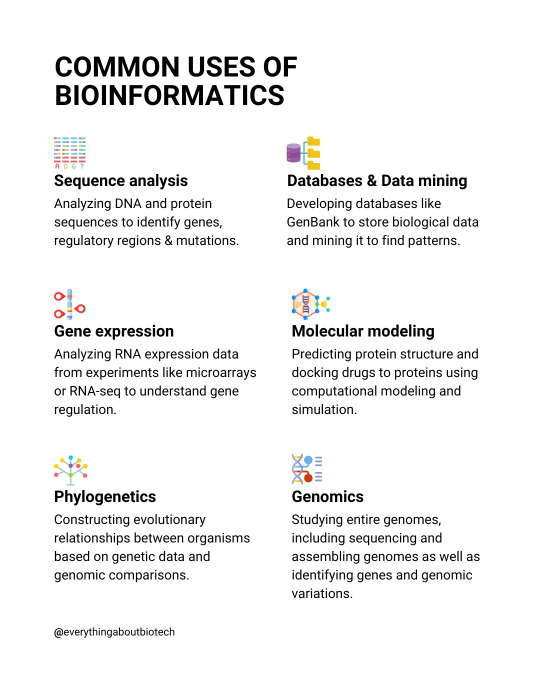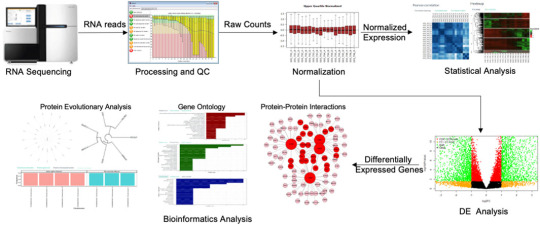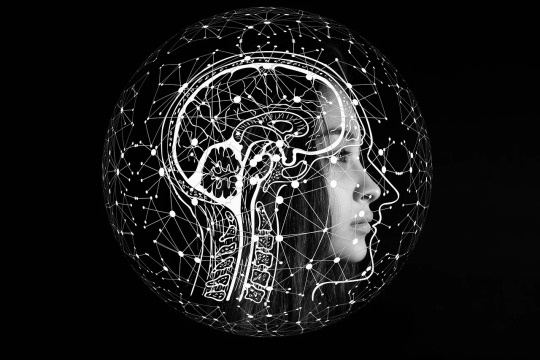#genomics in bioinformatics
Explore tagged Tumblr posts
Text
https://justpaste.it/f7dbu
#bioinformatics projects#ai bioinformatics#genomics in bioinformatics#microarray in bioinformatics#computational genomics#computational genetics#bioinformatics services#bioinformatics analysis of ngs data
0 notes
Text
Free online courses for bioinformatics beginners
🔬 Free Online Courses for Bioinformatics Beginners 🚀
Are you interested in bioinformatics but don’t know where to start? Whether you're from a biotechnology, biology, or computer science background, learning bioinformatics can open doors to exciting opportunities in genomics, drug discovery, and data science. And the best part? You can start for free!
Here’s a list of the best free online bioinformatics courses to kickstart your journey.
📌 1. Introduction to Bioinformatics – Coursera (University of Toronto)
📍 Platform: Coursera 🖥️ What You’ll Learn:
Basic biological data analysis
Algorithms used in genomics
Hands-on exercises with biological datasets
🎓 Why Take It? Ideal for beginners with a biology background looking to explore computational approaches.
📌 2. Bioinformatics for Beginners – Udemy (Free Course)
📍 Platform: Udemy 🖥️ What You’ll Learn:
Introduction to sequence analysis
Using BLAST for genomic comparisons
Basics of Python for bioinformatics
🎓 Why Take It? Short, beginner-friendly course with practical applications.
📌 3. EMBL-EBI Bioinformatics Training
📍 Platform: EMBL-EBI 🖥️ What You’ll Learn:
Genomic data handling
Transcriptomics and proteomics
Data visualization tools
🎓 Why Take It? High-quality training from one of the most reputable bioinformatics institutes in Europe.
📌 4. Introduction to Computational Biology – MIT OpenCourseWare
📍 Platform: MIT OCW 🖥️ What You’ll Learn:
Algorithms for DNA sequencing
Structural bioinformatics
Systems biology
🎓 Why Take It? A solid foundation for students interested in research-level computational biology.
📌 5. Bioinformatics Specialization – Coursera (UC San Diego)
📍 Platform: Coursera 🖥️ What You’ll Learn:
How bioinformatics algorithms work
Hands-on exercises in Python and Biopython
Real-world applications in genomics
🎓 Why Take It? A deep dive into computational tools, ideal for those wanting an in-depth understanding.
📌 6. Genomic Data Science – Harvard Online (edX) 🖥️ What You’ll Learn:
RNA sequencing and genome assembly
Data handling using R
Machine learning applications in genomics
🎓 Why Take It? Best for those interested in AI & big data applications in genomics.
📌 7. Bioinformatics Courses on BioPractify (100% Free)
📍 Platform: BioPractify 🖥️ What You’ll Learn:
Hands-on experience with real datasets
Python & R for bioinformatics
Molecular docking and drug discovery techniques
🎓 Why Take It? Learn from domain experts with real-world projects to enhance your skills.
🚀 Final Thoughts: Start Learning Today!
Bioinformatics is a game-changer in modern research and healthcare. Whether you're a biology student looking to upskill or a tech enthusiast diving into genomics, these free courses will give you a strong start.
📢 Which course are you excited to take? Let me know in the comments! 👇💬
#Bioinformatics#FreeCourses#Genomics#BiotechCareers#DataScience#ComputationalBiology#BioinformaticsTraining#MachineLearning#GenomeSequencing#BioinformaticsForBeginners#STEMEducation#OpenScience#LearningResources#PythonForBiologists#MolecularBiology
9 notes
·
View notes
Text

Common uses of bioinformatics
💡Sequence analysis Analyzing DNA and protein sequences to identify genes, regulatory regions & mutations.
💡Gene expression Analyzing RNA expression data from experiments like microarrays or RNA-seq to understand gene regulation.
💡Phylogenetics Constructing evolutionary relationships between organisms based on genetic data and genomic comparisons.
💡Molecular modeling Predicting protein structure and docking drugs to proteins using computational modeling and simulation.
💡Databases & Data mining Developing databases like GenBank to store biological data and mining it to find patterns.
💡Genomics Studying entire genomes, including sequencing and assembling genomes as well as identifying genes and genomic variations.
Follow @everythingaboutbiotech for useful posts.
#bioinformatics#genomics#proteomics#sequencing#PCR#biodata#bioIT#precisionmedicine#digitalhealth#biotech#DNA#healthtech#medtech#biostatistics#bioinformaticsjobs#BLAST#microarray#GenBank
54 notes
·
View notes
Text
Guys who work in bioinformatics and come from biology studies: how do you handle lack of inspiration problems? I like to code i find it very creative and genomics is an area that can help today's scientists answer many questions but i miss drawing anatomic parts and learning about fun molecules and pathways that was a big part of my joy during my undergraduate studies. Do you have any suggestions on this? Im currently reading Austin's Kleon book steal like an artist and he proposes having two desks one analog and one digital and work mostly on analog and edit final work on digital. But i struggle find a way to apply this in everyday tasks like NCBI data upload or run jobs in a cluster. Any thoughts?

#grad school#gradblr#phdblr#studyblr#study motivation#studyspo#academia#genomics#study notes#bioinformatics#computer science#creativity#ideas#inspiration
11 notes
·
View notes
Text
Wdym only 5 more exams to go
#ok i might rethink the one i want to take in September bc me and bioinformatics and genomics are not friends#so what if i took nanomedicine in September uh what then#idk idk
5 notes
·
View notes
Note
Hii how are you doing!!!
You're taking Bioinformatics too right? What resources are you using to understand it HELP—
Hii I'm good, thanks! Hbu? That's so cool you're self-studying bioinformatics too! You're coming from the bio side as well, right?
I haven't really gotten into actual bioinformatics stuff yet bc last I tried, I was overwhelmed by all the info I was expected to know...biology, stats, and coding/computer science stuff. I feel I still need to know more on all of those fronts, but coming from a life science background, the part that's most foreign to me is the coding aspect, so I'm trying to work through an intro to computer science mooc by Harvard called cs50x and figure out where to go from there... Also, the codeblr community has been nothing but extremely encouraging and helpful. Many have compiled resources for learning to code like in this post.
Sorry if this wasn't very helpful, I'm at the very very very beginning in this 😅 Maybe once I'm further along, I'll know enough to make a masterpost of resources I used and found helpful!
If anyone has any other suggestions, please feel free to add in the reblogs!
#stemblr#studyblr#chemblr#stem academia#stem student#codeblr#progblr#bioinformatics#computational biology#asks#mittonstudies#heyfrithams#heyharri#heydilli#heyzainab#benniscup#myhoneststudyblr#genomics#bioblr
21 notes
·
View notes
Text
#Bioinformatics#Genomics#DrugDiscovery#PrecisionMedicine#ArtificialIntelligence#MachineLearning#HealthcareInnovation#Biotechnology#DataAnalytics#ClinicalDiagnostics
0 notes
Text
🔬 Unlocking Cancer Secrets: Epistasis Explained!
#Epistasis #CancerResearch #GeneticsExplained #MolecularBiology #PersonalizedMedicine #GeneInteraction
Don't forget to like and share this video
Visit our page :
computationalbiologists.com
Nominations page : https://computationalbiologists.com/award-nomination/?ecategory=Awards&rcategory=Awardee
Follow us on:
Instagram : https://www.instagram.com/_awardresearcher_02/
Blogger : https://www.blogger.com/blog/posts/859633461166750462
Twitter : https://x.com/AwardResearcher
Facebook : https://www.facebook.com/profile.php?id=61573772493321
Tumblr : https://www.tumblr.com/computationalbiologistsawards?source=share
Pintrest : https://in.pinterest.com/awardresearcher/_profile/
Youtube : https://www.youtube.com/@ResearcherAward
#bioinformatics#drugdiscovery#pharmacology#genomics#machinelearning#biotech#aiinhealthcare#molecularbiology#crispr#cas9cas12a
0 notes
Link
#pioneering marketdigits consulting and advisory private limited#bioinformatics market#bioinformatics market size#genome sequencing#rna sequencing
0 notes
Photo




(via Global Bioinformatics Market Size, Trends and Outlook 2024-2030)
Global Bioinformatics market is estimated at US$15.1 billion in 2024 and anticipated to record a CAGR of 13.8% from 2024 to 2030 to reach US$32.8 billion in 2030. The bioinformatics market is driven by advancements in next-generation sequencing (NGS), artificial intelligence (AI), and big data analytics, enhancing data processing capabilities and storage.
0 notes
Text
Unlocking Insights: A Beginner’s Guide to Gene Expression Profiling and Pathway Enrichment
In the field of genomics, understanding the behavior of genes is essential to unlocking the mysteries of biology and disease. Two important techniques, gene expression profiling and pathway enrichment analysis, help researchers unravel the complexity of genetic regulation, allowing for a deeper understanding of biological processes, disease mechanisms, and therapeutic targets. This article provides a beginner’s guide to gene expression profiling and pathway enrichment analysis, explaining their significance, methods, and applications.

To explore more about applications of Gene Expression Profiling and Pathway Enrichment Analysis, you can visit Gene-omics.
If you want to learn about the genomics from the beginning, you can enroll for the Genome Analysis Bootcamp Demo Session here- https://edgeneomics.com/genome-analysis-bootcamp/
0 notes
Text
How AI is Being Used to Predict Diseases from Genomic Data

Introduction
Ever wonder if science fiction got one thing right about the future of healthcare? Turns out, it might be the idea that computers will one day predict diseases before they strike. Thanks to Artificial Intelligence (AI) and genomics, we’re well on our way to making that a reality. From decoding the human genome at lightning speeds to spotting hidden disease patterns that even experts can’t see, AI-powered genomics is revolutionizing preventative care.
This article explores how AI is applied to genomic data, why it matters for the future of medicine, and what breakthroughs are on the horizon. Whether you’re a tech enthusiast, a healthcare professional, or simply curious about the potential of your own DNA, keep reading to find out how AI is rewriting the rules for disease prediction.
1. The Genomic Data Boom
In 2003, scientists completed the Human Genome Project, mapping out 3.2 billion base pairs in our DNA. Since then, genomic sequencing has become faster and more affordable, creating a flood of genetic data. However, sifting through that data by hand to predict diseases is nearly impossible. Enter machine learning—a key subset of AI that excels at identifying patterns in massive, complex datasets.
Why It Matters:
Reduced analysis time: Machine learning algorithms can sort through billions of base pairs in a fraction of the time it would take humans.
Actionable insights: Pinpointing which genes are associated with certain illnesses can lead to early diagnoses and personalized treatments.
2. AI’s Role in Early Disease Detection
Cancer: Imagine detecting cancerous changes in cells before a single tumor forms. By analyzing subtle genomic variants, AI can flag the earliest indicators of diseases such as breast, lung, or prostate cancer. Neurodegenerative Disorders: Alzheimer’s and Parkinson’s often remain undiagnosed until noticeable symptoms appear. AI tools scour genetic data to highlight risk factors and potentially allow for interventions years before traditional symptom-based diagnoses. Rare Diseases: Genetic disorders like Cystic Fibrosis or Huntington’s disease can be complex to diagnose. AI helps identify critical gene mutations, speeding up the path to diagnosis and paving the way for more targeted treatments.
Real-World Impact:
A patient’s entire genomic sequence is analyzed alongside millions of others, spotting tiny “red flags” for diseases.
Doctors can then focus on prevention: lifestyle changes, close monitoring, or early intervention.
3. The Magic of Machine Learning in Genomics
Supervised Learning: Models are fed labeled data—genomic profiles of patients who have certain diseases and those who do not. The AI learns patterns in the DNA that correlate with the disease.
Unsupervised Learning: This is where AI digs into unlabeled data, discovering hidden clusters and relationships. This can reveal brand-new biomarkers or gene mutations nobody suspected were relevant.
Deep Learning: Think of this as AI with “layers”—neural networks that continuously refine their understanding of gene sequences. They’re especially good at pinpointing complex, non-obvious patterns.
4. Personalized Medicine: The Future is Now
We often talk about “one-size-fits-all” medicine, but that approach ignores unique differences in our genes. Precision Medicine flips that on its head by tailoring treatments to your genetic profile, making therapies more effective and reducing side effects. By identifying which treatments you’re likely to respond to, AI can save time, money, and—most importantly—lives.
Pharmacogenomics (the study of how genes affect a person’s response to drugs) is one area booming with potential. Predictive AI models can identify drug-gene interactions, guiding doctors to prescribe the right medication at the right dose the first time.
5. Breaking Down Barriers and Ethical Considerations
1. Data Privacy
Genomic data is incredibly personal. AI companies and healthcare providers must ensure compliance with regulations like HIPAA and GDPR to keep that data safe.
2. Algorithmic Bias
AI is only as good as the data it trains on. Lack of diversity in genomic datasets can lead to inaccuracies or inequalities in healthcare outcomes.
3. Cost and Accessibility
While the price of DNA sequencing has dropped significantly, integrating AI-driven genomic testing into mainstream healthcare systems still faces cost and infrastructure challenges.
6. What’s Next?
Realtime Genomic Tracking: We can imagine a future where your genome is part of your regular health check-up—analyzed continuously by AI to catch new mutations as they develop.
Wider Disease Scope: AI’s role will likely expand beyond predicting just one or two types of conditions. Cardiovascular diseases, autoimmune disorders, and metabolic syndromes are all on the list of potential AI breakthroughs.
Collaborative Ecosystems: Tech giants, pharmaceutical companies, and healthcare providers are increasingly partnering to pool resources and data, accelerating the path to life-changing genomic discoveries.
7. Why You Should Care
This isn’t just about futuristic research; it’s a glimpse of tomorrow’s medicine. The more we rely on AI for genomic analysis, the more proactive we can be about our health. From drastically reducing the time to diagnose rare diseases to providing tailor-made treatments for common ones, AI is reshaping how we prevent and treat illnesses on a global scale.
Final Thoughts: Shaping the Future of Genomic Healthcare
AI’s impact on disease prediction through genomic data isn’t just a high-tech novelty—it’s a turning point in how we approach healthcare. Early detection, faster diagnosis, personalized treatment—these are no longer mere dreams but tangible realities thanks to the synergy of big data and cutting-edge machine learning.
As we address challenges like data privacy and algorithmic bias, one thing’s certain: the future of healthcare will be defined by how well we harness the power of our own genetic codes. If you’re as excited as we are about this transformative journey, share this post, spark discussions, and help spread the word about the life-changing possibilities of AI-driven genomics.
#genomics#bioinformatics#biotechcareers#datascience#biopractify#aiinbiotech#biotechnology#bioinformaticstools#biotech#machinelearning
4 notes
·
View notes
Text
SciTech Chronicles. . . . . . . . .Mar 24th, 2025
#genes#chromosome#hippocampus#myelin#Aardvark#multimodal#GFS#democratising#cognitive#assessment#Human-AI#Collaboration#E2A#192Tbit/s#Alcatel#2028#genomics#bioinformatics#antimicrobial
0 notes
Text
youtube
#Genomics#biomarkers#pharmacogenomics#targeted therapy#bioinformatics#molecular diagnostics#immunotherapy#AI-driven analytics#genetic profiling#big data#epigenetics#proteomics#metabolomics#disease prediction#early diagnosis#individualized drug response#cancer therapy#regenerative medicine#precision oncology#digital health.#Youtube
0 notes
Text
#GeneticData#Bioinformatics#GeneticAnalysis#HealthTech#DataScience#DNASequencing#Genomics#BioinformaticsTools#GeneticSoftware#MedicalResearch#PersonalizedMedicine#GeneEditing#GeneticResearch#HealthcareInnovation#AIInHealthcare#OmicsTechnology#GeneticTesting#PrecisionMedicine#DataAnalytics#HealthData#GenomicTechnology
0 notes